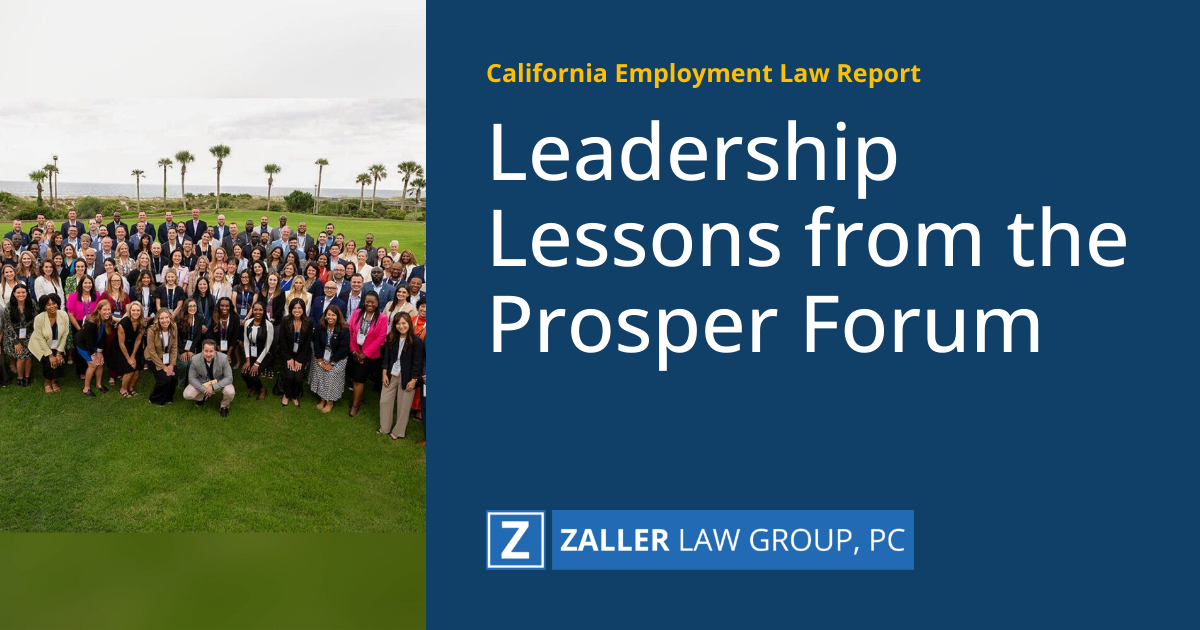This past week, we hosted the Prosper Forum in Amelia Island, Florida. The gathering brought together leaders from across the hospitality industry to share not only strategy and insight, but also wisdom about what it truly means to lead.
A handful of short quotes from the speakers stuck with me. They may sound simple at first, but each carries a depth that every leader—whether in hospitality, law, or any industry—can learn from.
1. “Actions speak louder than words.” – Greg Creed
It’s a cliché, but one that endures because it’s true. Teams don’t follow lofty mission statements or corporate slogans—they follow what leaders do day in and day out.
When a leader takes responsibility, shows respect, and demonstrates consistency, those actions cascade throughout the organization. On the other hand, when there’s a disconnect between what leaders say and what they do, the credibility gap grows fast. The Prosper Forum was a reminder that leadership is never abstract—it’s lived in the small, daily behaviors that set the tone for everyone else.
2. “Do the job that no one else wants to do.” – Greg Creed
This lesson resonates across industries. Leadership is often portrayed as glamorous—big speeches, important meetings, bold strategy. But the reality is that the best leaders are willing to step into the unglamorous tasks too.
When leaders roll up their sleeves—whether it’s cleaning up a mess, tackling a complex compliance issue, or handling a difficult conversation—they send a message: “I’m not above the hard work. I’m with you in it.” That kind of humility builds loyalty and trust, because teams see that leadership isn’t just about giving direction, but also about being part of the grind.
3. “Embrace the detour.” – Greg Creed
Life and business rarely unfold in straight lines. Detours can be frustrating, but they often carry hidden opportunities.
A detour might force a team to slow down and see problems differently. It might lead to a new innovation or a stronger bond among colleagues. Leaders who embrace the detour cultivate resilience—not only in themselves but in their organizations. They show that setbacks are not roadblocks, but stepping stones.
4. “As a high-level executive, your decisions are 50/50.” – Christine Barone, CEO of Dutch Bros
This was one of the most powerful lessons reinforced at the Forum that Christine mention during a panel discussion in the general session. Then, during a webinar I was hosting from the Forum, two stories brought it to life even more for me:
Reggie Stover shared a memory from his time in the Army. While in training, his squad was ambushed. In that moment, he froze. Afterward, his general asked him what he had done wrong. Reggie admitted he had made no decision at all. The general explained that the problem wasn’t whether the decision was “right” or “wrong”—it was that he hadn’t moved forward. Leaders must make decisions, even with imperfect information. Standing still is the greater risk.
Josh Halpern, CEO of Big Chicken, echoed this lesson with a story from earlier in his career. He was tasked with choosing between two advertising agencies. Torn between the options, he asked his boss which one he should hire. His boss replied, “If I had to make the decision, I wouldn’t need you.” Josh made the call, it worked out, and later he asked which agency his boss would have chosen. The boss laughed and admitted he would have gone with the other one. The point? Leadership isn’t about finding the perfect choice—it’s about owning the decision and leading forward.
Both stories drive home that high-level leadership is about decisiveness. In reality, most executive decisions are 50/50. The key is to make the call, own it, and keep moving.
5. “So goes the leader, so goes the rest.” – Christine Baone & “Organizations can forget how to win.” – G.J. Hart, Former CEO of Red Robin
These two insights from Christine and G.J. go hand in hand.
Leaders set the tone—if they’re energized, committed, and resilient, their teams will be too. But if they are burned out or disengaged, the organization will reflect that. At the same time, companies can lose their edge when they drift from the fundamentals of discipline, execution, and celebrating wins.
Leaders have to guard against complacency, continually reminding their teams what “winning” looks like. And they must embody the mindset they want to see: sharp, hungry, focused, and optimistic.
Closing Thought
The Prosper Forum was a powerful reminder that leadership isn’t about theory—it’s about practice. These lessons are deceptively simple: lead with action, humility, resilience, decisiveness, and a contagious example. But simple doesn’t mean easy.
As I left Amelia Island, I kept coming back to one thought: the best leaders aren’t the ones with all the answers. They’re the ones who keep moving forward, bringing their teams with them, and teaching organizations how to win again and again.
